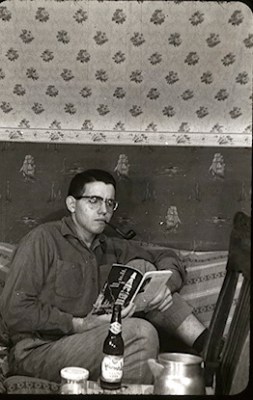My father put together a Heathkit shortwave radio in his youth. The radio is still there in my childhood home. He’s still alive so this isn’t saccharine reminisces of a man who passed. Dad still sits in that room with the radio, the radio still works, his hands pound away at the Internet all day now, the radio forgotten but still as vital as the day he built it. My Dad is a little less vital, but he’s hanging in there.
My hands are like his. The knuckles tend to callus for some reason and, although he has his Hungarian father’s miner’s hands, meaty and thick (he earned those hands, I like to think), and mine are weak, you can still see the potential for density in mine. If hadn’t ended up behind a keyboard I’d probably really have his hands. Instead I can play a guitar and put transistors into a breadboard with my own kids and marvel at a world that he and my mother made entire when they were married and had my sister and I and how my sister and I had kids and how we all, in turn, are worlds entire. That’s what Dads are good for, sometimes: for reminding you that you came from some place that was rougher and meaner or far different than your own place and that Dad escaped that rough, mean place to try to make a nicer place with a nice woman he met somewhere.
And my Dad passed along all sorts of habits that helped me on the way. He told me about his Heathkit radio, for example, and told me that with the right schematics you can fix anything. He had me hold open a Chilton repair manual as we tore the brakes out of our old Ford Fairmont so I could learn to follow directions. He let us trample his spring onions while he dug up the garden with a roto-tiller and he explained the oil and gas mixtures needed for his old Toro so I could know the pleasure of simple machines. He told me to always use anti-seize compound and, to my chagrin, I still do whenever I have to fix something big. He taught me to plan ahead.
He also taught me a love of words and bought hundreds of books at a used book sale at the Columbus Public Library. If I needed to know something – Soviet history, the botany of poison ivy – the book I needed was right there. If it wasn’t he’d take us back to the library. He taught me to read with care and caution and to write with wit and intelligence. He worked every day of his life pushing papers at a military depot so we could have a big house with enough room for all the books he amassed. He taught me to look back and to create.
Your Dad, if you had one who was close and didn’t die early, was hopefully like mine. I like to think a lot of them are, even given the horrors some Dads have inflicted on their kids, horrors I’ve witnessed firsthand and heard about from friends. I like to think that when that woman your Dad met that delivered that first child, your Dad teared up a little and swore on whatever strange star put them in this place that the baby would have a good home full of schematics, books, and food. I hope your Dad taught you how to be smart and self-sufficient and gave you a model for your behavior. I hope your Dad is the kind of Dad you wanted to make laugh and when you made him laugh it was the greatest thing in the world. And I hope your Dad is still alive and pounding away at a computer somewhere or is puttering in the garage or is pulling up early tomatoes.
And if wasn’t that great, so what? You have a chance to make up for it. About fifty percent of us get a chance to be a Dad and we can take it or we can leave it and nothing and everything changes when we make the decision to go through with what our fathers and our fathers before them went through, namely the decision that these hands are too important to let wither and should instead be used to lift babies out of cribs and tune shortwave radios for a young daughter fascinated by geography and to pull weeds and make things that were small and unimportant grow and become important. That’s our choice. Sometimes it makes more sense not to revisit the bad, mean places and sometimes it makes sense not to have kids, but sometimes it does.
So here’s to Dads who, literally, built our world up around us. They built the Internet for us. They built our laptops and phones and their ideas helped form our world. They drew the schematics and with the right schematics we can fix anything. We may not always see eye to eye, but Dads are always ready to point into the distance and say “That’s where you’re going. I can give you help, but it’s your job to get there in one piece. There is a cloud over there, but every step you take will reveal just a bit more of the road ahead. You will build the world just as I did. Good luck.”
Here’s to Dads. Thanks.
